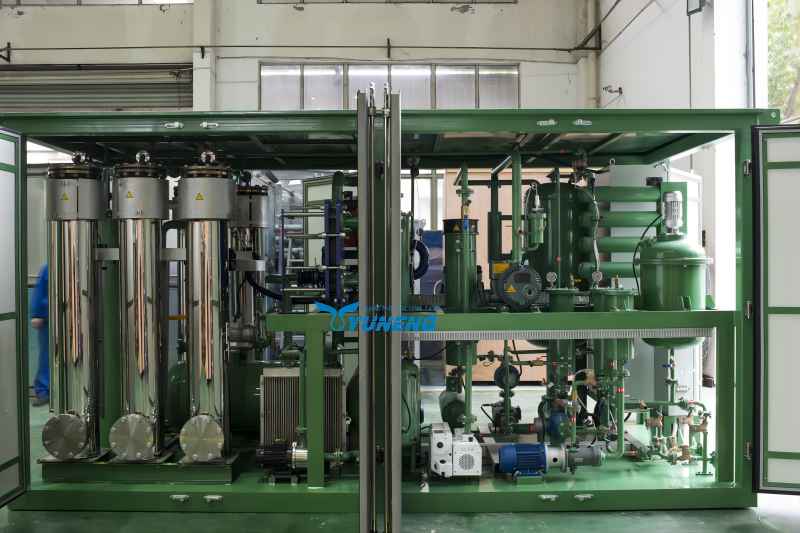How Regenerated Transformer Oil Prolongs Transformer Life Expectancy
The function of transformer oil is vital in making sure the integrity and long life of transformers, serving as both an insulator and coolant. Regrowed transformer oil provides a compelling remedy to boost these functions by properly removing dangerous pollutants that endanger efficiency. With a careful regeneration procedure, the oil's dielectric homes and thermal stability can be brought back, bring about considerable enhancements in functional effectiveness. Comprehending the complexities of this procedure and its wider implications for transformer upkeep reveals a path to not just extend life expectancy however likewise optimize costs in power administration systems.
Relevance of Transformer Oil
Transformer oil plays a critical duty in the effective operation of electrical transformers. It mostly works as a shielding tool, stopping electric discharges and making sure that elements run safely under high voltage conditions. The oil's dielectric homes are essential to preserving the integrity of the transformer, as they reduce the danger of failings that could lead to pricey downtimes or tragic cases.
Along with its protecting capacities, transformer oil also operates as a coolant. As transformers run, they generate warmth that needs to be dissipated to prevent getting too hot and succeeding damages. The oil flows within the transformer, transferring and absorbing heat away from crucial elements, thereby maintaining optimum operating temperature levels.
Furthermore, transformer oil works as a barrier against wetness and impurities, which can jeopardize the performance and durability of the transformer. Its chemical buildings aid in counteracting acids and various other byproducts that might create gradually, contributing to the total health and wellness of the electric system.
Benefits of Regenerated Oil

Additionally, regenerated transformer oil has a reduced degree of pollutants, consisting of fragments and impurities that can break down performance. This purity not only boosts the oil's thermal conductivity however additionally expands the operational lifespan of transformers by reducing overheating risks. The improved thermal security of regrowed oil ensures constant performance even under high operating temperatures, which is important for preserving transformer efficiency.
Another benefit is its environmental influence. Regenerated oil advertises sustainability by decreasing waste and the demand for brand-new oil production, consequently decreasing the carbon footprint related to transformer upkeep. Transformer Oil Regeneration Plant. Furthermore, the durability of regrowed oil translates to reduced maintenance costs gradually, as less oil modifications and less constant tools downtime are needed.
Process of Oil Regeneration
The regrowth of transformer oil entails a systematic procedure created to bring back the oil's original homes and enhance its efficiency. This procedure typically starts with the elimination of the utilized oil from the transformer, which is then subjected to various filtration methods.
The very first action in the regrowth process is the filtering, where solid pollutants such as dust, steel, and sludge particles are gotten rid of. This is commonly adhered to by vacuum distillation, which aids to eliminate wetness and volatile compounds, consequently improving the oil's dielectric toughness.

Effect On Transformer Performance
Bring back the properties of regenerated transformer oil considerably affects the general performance of transformers. Boosted dielectric strength is just one of the most vital benefits, as it enables for much better insulation and lowers the chance of electrical break down. This renovation leads to a more stable operation under high voltage problems, ultimately resulting in enhanced effectiveness.
Furthermore, the removal of contaminants and deterioration items throughout the regeneration procedure minimizes the danger of getting too hot. Cleanser oil promotes better warmth dissipation, which is vital for preserving ideal operating temperature levels. Therefore, the thermal efficiency of the transformer is enhanced, permitting higher lots without endangering dependability.
Additionally, the chemical security of regrowed oil ensures prolonged operational life. It resists oxidation and deterioration, reducing the frequency of upkeep interventions and oil other substitute. This security visit our website not only adds to boosted performance however likewise lines up with sustainability objectives by lessening waste.
Future of Transformer Maintenance
As innovations in innovation remain to improve the landscape of electric engineering, the future of transformer maintenance is poised for substantial change. The integration of smart modern technologies, such as IoT sensing units and anticipating analytics, enables real-time surveillance of transformer health, boosting the capacity to preemptively resolve concerns before they rise into significant failures. This proactive method not just optimizes operational performance however additionally expands the lifespan of transformers.
In addition, the application of fabricated knowledge (AI) in information analysis allows for more accurate fault discovery and diagnosis. By leveraging artificial intelligence algorithms, upkeep teams can identify patterns in operational data that human experts may overlook, causing even more educated decision-making.
Additionally, the adoption of eco-friendly techniques, consisting of making use of regenerated transformer oil, is readied to redefine upkeep protocols. This lasting strategy not just reduces environmental effect however additionally enhances the overall wellness of the transformer.
Finally, the change towards automation in upkeep procedures is anticipated to enhance operations, minimize downtime, and lower prices. As these technologies continue to develop, the future of transformer maintenance will most certainly end up being more reliable, trustworthy, and sustainable, making sure the honesty of important electrical facilities.
Verdict
The utilization of Your Domain Name regenerated transformer oil dramatically enhances the operational longevity of transformers. Ultimately, the adoption of regrowed oil represents a pivotal improvement in transformer upkeep, ensuring optimal performance and sustainability in the administration of electric framework.
The duty of transformer oil is critical in ensuring the reliability and long life of transformers, serving as both an insulator and coolant.Transformer oil plays an essential duty in the effective procedure of electrical transformers. Restored oil advertises sustainability by minimizing waste and the requirement for new oil production, thus lowering the carbon impact connected with transformer maintenance.Restoring the residential or commercial properties of regenerated transformer oil substantially influences the overall performance of transformers.The utilization of regenerated transformer oil considerably boosts the operational long life of transformers.